
Social Epistemology | SERRC | Collective Studies in Knowledge and Society | Frontiers in Human Dynamics: Digital Impacts | Kino Kino | Society for Philosophy of Information | ARI Newsletter
The Other AI | Phenomenology and Technology | The Fourth Industrial Revolution | Techno-Imaginations 2: Internet Lore in Asia | Writing the Internet: Internet Lore in Asia | The Industrial Revolution 4.0: Preparing for Disruptive Technologies in Asia | Techno-Imaginations on Screen | Technology and Pedagogy Unconference | Engaging Expertise in Disaster Governance

On 11th December 2019, I attended the Inception Workshop and Programme Launch of the Social Economic Policies Asia (SOPAS) 2020-2022 Cycle. This is a regional forum that aims to contribute to the debate and reform of economic and governance models in Asia and is organized by Konrad-Adenauer-Stiftung Tokyo (KAS-Tokyo) and aims to bring together “a network of policy makers, economists, political analysts, and thought leaders across Asia-Pacific to discuss emerging issues, propose policy alternatives, and share best practices.” (quoted from the workshop programme)
The 2020-2022 cycle focuses on three strategic areas: (1) advancing female leadership, (2) free trade consolidation, and (3) the future of work. The programme will primarily work with the following countries: India, Japan, Singapore, South Korea, Taiwan and Viet Nam.
The workshop was attended by a broad range of delegates including the Secretary General of the ASEAN-Japan Centre, Dr. Masataka Fujita, the Head of the Asia and Pacific Team at KAS, Dr. Peter Hefele, Former Director of the ASEAN+3 Macroeconomic Research Office (AMRO), Dr. Yoichi Nemoto, and academics, policy-makers, and industry professionals from Japan, Taiwan, Hong Kong, India, South Korea, Singapore, Viet Nam, and China.
The workshop aimed to jointly identify and define the themes covered and possible areas for cooperation under the three strategic areas listed above. There will be a series of workshops and other potential outputs such as publications, conferences, and seminars later in 2020.
My role was to design and facilitate the third of three workshops that each concerned the above three strategic areas viz. the future of work. My workshop focused on understanding the impact of emerging technologies on work, skills, and employment in Southeast Asia. It also looked at the effects of digitization and the risks of automation and precarity. Participants explored disruptions caused by new technologies and the ways in which these may provide both risks as well as opportunities. The workshop was run as a “World Café” in which, after my introductory lecture, participants split into rotating groups to answer a series of questions focused on different aspects of the future of work.
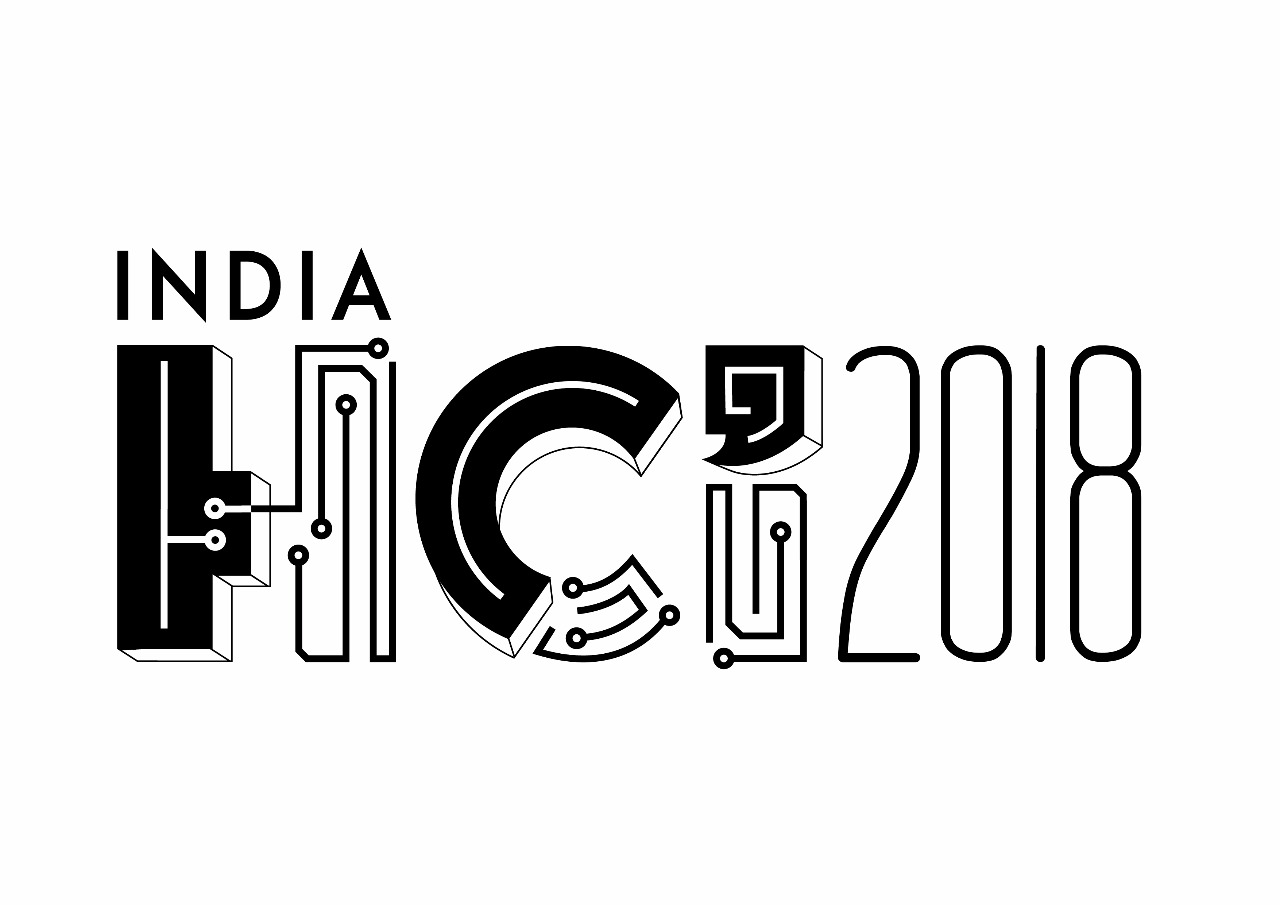
This is a workshop Vivek and I organized for HCI (Human-Computer Interaction) India in Bangalore. Vivek introduced participants to the use of phenomenology in design while I went into the relationship between thinking and technology.
The aim of the course was to delineate the 4E (Embodied, Embedded, Extended, and Enactive) approach to interaction in terms of its phenomenological and physiological basis. The course built upon philosophical viewpoints of phenomenology as well as physiological viewpoints of activity theory and ecological psychology. Our goal was to show that these viewpoints that have already been accepted as part of second-wave of HCI still possess fundamental insights about human knowing, acting and being and can be used for addressing modern day third-wave HCI research, in India (and more broadly the global south).
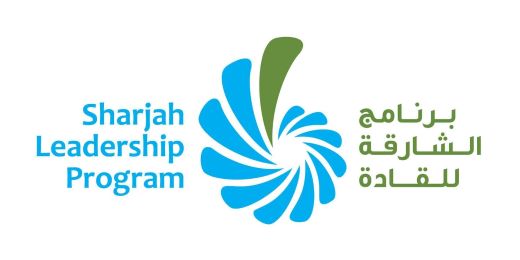
I was invited to run a workshop for students from the Sharjah Tatweer Foundation's Leadership Program who were visiting Singapore to learn about the Smart Nation Initiative and surrounding developments.
Participants: Students from the Sharjah Tatweer Foundation Leadership Program, Michiel Bass, Greg Clancey, Jonathan Rigg, Song DongHyun
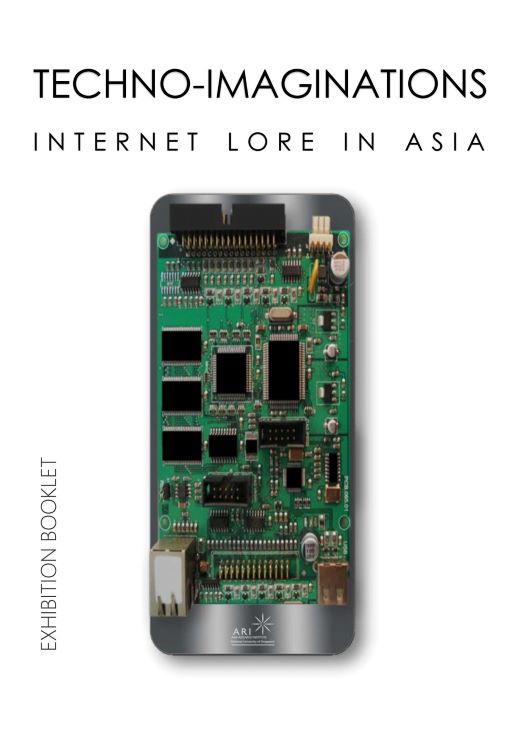
We held a multimedia exhibition alongside the workshop which I curated with Nancy Mauro-Flude. This was the second of my Techno-Imaginations exhibitions, the first being held in conjunction with the Society for the History of Technology in 2016. Our idea was to break the boundary that often exists between artists and academics when the former is invited to the latter's conferences. We've written about this process and hosted images from the artists' exhibitions at an accompanying website.
Participants: Paolo Casani, Katrina Irawati Graham, Eric Kerr, Briony Kidd, Nancy Mauro-Flude, Alex Mitchell, Olivier Perriquet, Teik-Kim Pok, Kamini Ramachandran, Eugene Soh
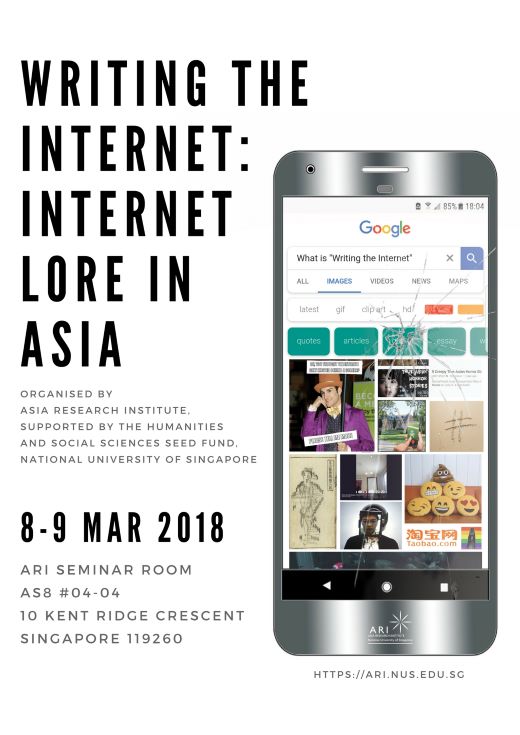
This workshop came out of our Folklore and Digital Technologies project which Greg, Connor, and I received funding for in 2016. Aieshah Arif, the Research Assistant on the project, and I compiled a booklet that describes the aspects and outcomes of the project. Connor and I also wrote about it for the ARI newsletter. We were keen to have a wide set of disciplines and practices represented (STS, the philosophy of technology, anthropology, media studies, critical theory, sociology, policy studies, political science, history, digital humanities, film studies, theatre studies, computer science, media design, and cultural studies).
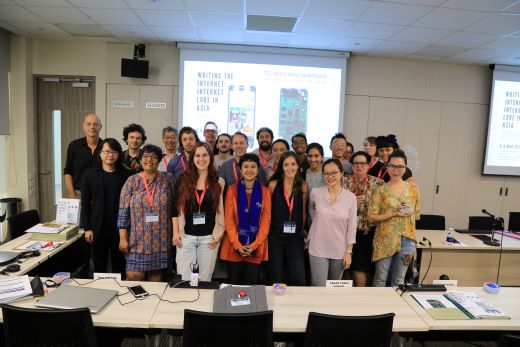
The idea behind the workshop was to critique what it means to write the Internet in the sense of emerging narratives in digital communities, the recasting of traditional stories and mythologies, the underlying languages and infrastructures of the Internet, and what it means for us, as writers, to write about the Internet.
The workshop was opened by the media scholar and Internet critic Geert Lovink who spoke about disconnection and the changing ecosystem of social media. This was followed by five panels: approaches, infrastructure, real-isations, figures and literacies, and forms and movement. At the end of each day’s panels, we held writing forums where panel members collaborated on a written response to their panel. It was important to us to write as well as talk during this event.

Artists, writers, storytellers, folklorists, and film-makers took part in the same panels as academics. It included works on networked improvisation, folklore-inspired film screenings, 3D modelizations of Singaporean mythology (from a project which Olivier and I have been working on), VR apps, social media analytics, live performance, and a “storytelling session” hosted by the director of the Singapore Storytelling Centre, Kamini Ramachandran.
Participants: Crystal Abidin, Itty Abraham, Greg Clancey, Celine Coderey, Gabriele de Seta, Connor Graham, Katrina Iriwati Graham, Soraj Hongladarom, Yuk Hui, Eric Kerr, Briony Kidd, Clarissa Lee Ai Ling, Sun Sun Lim, Geert Lovink, Nancy Mauro-Flude, Alex Mitchell, Jason Morris-Jung, Natalie Pang, Olivier Perriquet, Teik-Kim Pok, Kamini Ramachandran, Jillet Sarah Sam, Sarah-Tabea Sammel, Nishant Shah, Hallam Stevens, Malini Sur, Miguel Escobar Varela
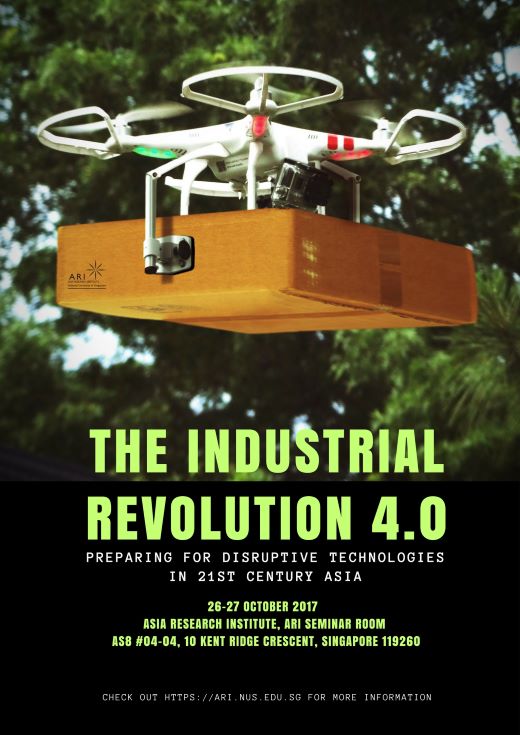
DongHyun Song and I seemed to hit upon a topical theme here. This is the first conference I've held where I've had newspapers calling me for an interview. It also led to the Sharjah Tatweer Foundation contacting me to organize a workshop for students in their leadership programme. This conference put academics into conversation with NGOs. Our goal was to raise the voices of vulnerable populations in Southeast Asia who will be most affected by the changes brought as ICBM technology (I.O.T., Cloud, Big Data and Mobile) and Artificial Intelligence systems (A.I.) become the logic of operation that sustains the world's economy. Asian governments have been developing policy frameworks to respond to these changes: e.g. Singapore's 'Smart Nation Initiative' (2014), China's 'Made in China 2025' (2015), India's '100 Smart Cities' project (2015), and South Korea's 'Comprehensive Countermeasures on Artificial Intelligence Society' (2016).

Participants: Paul Berry, Chang Jae Hee, Samuel Chng, Chong Pak Lei Gladys, Chua Beng Huat, Chua Hui Ching Emily, Ken Dean, Mohan Dutta, Feng Chen-Chieh, Adam Fish, Marianne Franklin, Mike Griffiths, Gu Xin, Hagorly M. Hutasuhut, Margaret Jack, Joo Yu-Min, Eric Kerr, Liew Kai Khiun, V.V. Krishna, Rakesh Kumar, Brett Neilson, Tanya Notley, Natalie Pang, Ned Rossiter, Martin Searle, Pip Shea, Tina Shreshta, DongHyun Song, Hallam Stevens, Tan Teck-Boon, Poon King Wang, Thijs Willems, Mouyly Vichhra
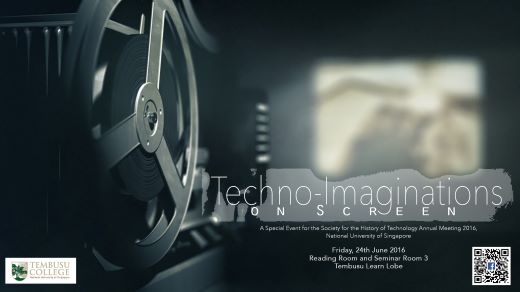
This was the first iteration of my Techno-Imaginations series. The festival showcased Singapore-based and international film-makers and artists who are using creative cinematic techniques and exploring provocative subject matter in Asia and beyond. The collection reimagined technologies from the everyday to the state-of-the-art both in their visual narratives and the production of the film itself.
Participants: Richard Baxstrom, CADA (Sofia Oliveira and Jared Hawkey), Anirban Datta, George Jose, Eric Kerr, Charles Lim Yi Yong, Olivier Perriquet, Sarah-Tabea Sammel, Sanyukta Sharma, Malini Sur, Tan Jingliang, Vladimir Todorovic, Vipin Vijay.

This was my first foray into organizing a pedagogy event in Singapore. Ellan Spero, Catelijne Catelijne, and I based it around the BARCamp format (revised for STS as a "Technology and the Humanities Camp"). We held the event in SUTD's playroom. A BARCamp is a kind of unconference. Participants meet in the morning to share their ideas and an agenda is figured out on the spot.
My own contribution focused on teaching with what I called "non-technological technologies". The technological revolution in higher education is regularly promised but, like flying cars and jetpacks, seems to be always just on the verge of arriving. MOOCs and DOCCs, flipped or virtual classrooms, screencasting, and e-learning dominate the current landscape but in previous decades typewriters, projectors, educational television, and CD-ROMs brought with them renewed promises of a pedagogical paradigm shift.
Often this revolution is portrayed in terms of technological interventions, additions, and disruptions in what is taken to be a non-technological space. But hasn’t teaching always been technological? Were not abacuses, writing slates, ink pots, and blackboards technologies with their own particular scripts for scholastic action? Are not both books and e-books technological aides?
In truth, technologies have always been a part of teaching but we seem to spend much less effort reflecting on the influence of these outmoded methods than the potential impacts of Udacity or Minerva University. The purpose of this session is not to assess whether or not revolutions in teaching tracked technological innovations, nor to embrace or thwart new revolutions. Instead, we will explore the contention that anachronistic technologies offer particular values that cannot or should not be superseded by hi-tech solutions. We will look at the pedagogic values of lo-fi technologies, slow technologies, and ‘non-technological’ technologies. What does the ‘low tech’ classroom offer an educator and a student?
The event was organized in conjunction with the 2016 meeting of the Society for the History of Technology which was held at NUS and for which I was on the local organizing committee.
Participants: Sridhar Adepu, Philip Brown, Paul Ceruzzi, Catelijne Coopmans, Evangeline Enriquez, Sy Goodman, En Chou Han, Rocky Howe, Farhan M. Idris, Khurum Nazir Junejo, Eric Kerr, Clarissa Lee Ai Ling, Wei Yi Leow, Samson Lim, Karsten Marhold, Karen McNamara, Peter Meyer, Joanne Miranda, Teasel Muir-Harmony, Kelvin Pang, Jeff Schramm, Ellan Spero, Vincent Zeng

As the frequency and interactive impacts of environment-related disasters continue to rise in Asia and around the world, a shift from expert and professional management of disasters to emerging forms of disaster governance is occurring.
Our workshop explored the production, circulation, interaction, and uses of different kinds of knowledge and expertise in governance for resilience, disaster planning and recovery. By using the term governance, the intention is to acknowledge that disasters are political, and, further, they engage many forms of knowledge and expertise that require governance mechanisms to accommodate, integrate and resolve.
With this in mind, the workshop aimed to live up to the spirit of a workshop by incorporating events and occasions for productive exchange of ideas and spaces to work on innovative proposals for scholarly engagement in disaster governance. These included bringing alternative perspectives to issues of expert knowledge, academic expertise, and disaster studies including a documentary film, a field trip (to Singapore’s NEWater wastewater recycling facility, poetic forms of engagement, philosophical thought experiments, and a roundtable which included discussion of pedagogic engagement and satirical artworks that spur engagement with disaster studies.

We brought together early-career scholars and leading experts from inter- and multidisciplinary backgrounds to examine how critical traditions in the humanities and social sciences can traverse the realms of applied research with regard to interventions in the so-called “real world,” whether these be actions on the ground or contributions to policy. Our workshop yielded valuable insights from various countries in the region including Singapore, Japan, China, and Indonesia.
Historian Scott Knowles opened the conference by analysing the “resilience revolution” in the global disaster bureaucracy and technical disaster research fields, questioning the relationship between the “lessons learned” from research in the social sciences and health fields and implemented environmental policy and technological risk-taking. The first day proceeded with three panels on the themes of intervention, the ethical dimensions of disaster governance, and community engagement in disaster recovery. Each session comprised two speakers. This was followed by a screening of the documentary film, A Journey to Namie, by Sulfikar Amir. The second day began with a fieldtrip to NEWater. Building on the previous day’s presentation by Martha Kaplan who addressed issues of water governance facing Singapore and the shift from reliance on imported water to self-sufficiency, our fieldtrip was a catalyst for “acting out” engagement in disaster governance. Following the trip, Kim Fortun sketched an analytic framework for characterizing disaster anticipation based on her extensive research on “fast and slow disasters”. This was followed by a roundtable on engaged scholarship which introduced new ideas for engagement and coalesced thoughts and discussions that had emerged from the previous day and a half.
Participants: Sulfikar Amir, Caroline Brassard, Simone Chung, Mike Douglass, Eli Elinoff, Kim Fortun, Axel Gelfert, Martha Kaplan, Eric Kerr, Scott G. Knowles, Michelle Miller, Khaerun Nisa, Lisa Onaga, Rita Padawangi, Jonathan Rigg, Behnam Taebi, Tyson Vaughan, Wong Pak-Hang